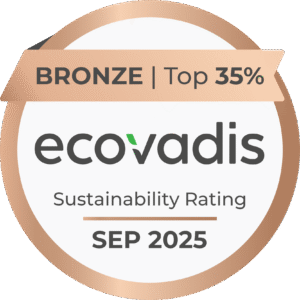Axion Polymers is a circular economy business.
Sustainability is built into the way we work and the way we think. For us, success means both maximising materials recovery and minimising environmental impact.
Following the recent decision to merge systems and structures with our parent company S. Norton Group (who acquired Axion Polymers in 2018), we are in the process of reviewing sustainability across our combined operations.
This is allowing us to set baseline measures, consolidate what we are already doing well, identify where we need to be better, and agree new targets.
Maximising materials recovery
The materials for Axion products are recycled from the non-metallic elements of end-of life vehicles, waste electrical equipment, and other scrap metal items.
To recover usable materials, we take S. Norton Group metal shredder residue and put it through a series of cleaning and separation processes at our Shredder Waste Advanced Processing Plant (SWAPP). Separation techniques include induction (ISS) and laser scanning (KSS). We are constantly refining our processes to increase the amount we can recover. As an example, we have successfully achieved greater separation efficiency for plastics containing persistent organic pollutants (POPs) than required by the environment agency – and we’re working to improve this further.
By producing high-grade products from materials that would otherwise be lost, we conserve precious resources, divert waste from landfill, and reduce the need for new raw materials. This in turn means less mining, less demand for oil-based virgin polymer, and lower levels of greenhouse gas emissions.
Zero waste commitment
S. Norton Group has set a goal of recycling 100% of the material received (subject to what is achievable within the legal framework) via improved processes. The Group currently averages 95%.
At Axion, we process around 140,000 tonnes of shredder residue annually. From this, we produce approximately 18,000 tonnes of high quality extruded polymer for manufacturing.
Example CO2 savings from making goods with Axion recycled plastics instead of virgin polymer (per tonne):
- Axpoly ABS – 2.8 tonnes
- Axpoly PP – 1.3 tonnes
Minimising environmental impact
We take responsibility for the environmental impacts of our activities and keep working to reduce them. Following a ‘Best available techniques’ (BAT) approach, we research and implement the techniques that will best prevent or minimise emissions and harmful impacts on the environment.
EcoVadis Assessment
We are using EcoVadis assessment to help create a robust Group sustainability baseline, decide on priority actions, and set new company-wide policies and practices.
EcoVadis assessment covers 21 sustainability criteria across four core themes: Environment, Labor & Human Rights, Ethics and Sustainable Procurement. In 2025, we achieved a score of 74% for Environment and an overall score of 67%. This earnt S. Norton Group a bronze medal and an Advanced category rating, and places us in the top 35 % of all companies assessed globally. Within the materials recovery sector, 31% of companies assessed reached Advanced level, with none reaching the one higher category of Outstanding.

Energy consumption and greenhouse gas emissions
Across the combined S. Norton metals recycling and Axion operations, we are making sustained progress in reducing both energy consumption and Scope 1 and 2 greenhouse gas emissions.
To drive this progress further, we are:
- Participating in the Energy Savings Opportunity Scheme (ESOS), which includes independent energy audits
- Developing a Group Energy Plan
- Introducing static asset sub-metering for granular energy use detail
- Replacing and updating assets for greater energy efficiency and lower emissions
- Implementing multiple fleet initiatives to boost fuel efficiency (recognised by our Fleet Operator Recognition Scheme Bronze accreditation)
Further environmental protection measures
Additional measures we are taking to protect the environment include:
- Developing a group water-saving plan.
- Introducing a formal air quality monitoring regime.
- Sampling water effluent monthly.
- Enhancing fire protection systems.
- Conducting annual noise surveys.
Climate change risks
To help us plan for the impact of climate change on our operations, we have completed a Climate Change Risk Assessment. We will be using this to formulate a climate change policy.
